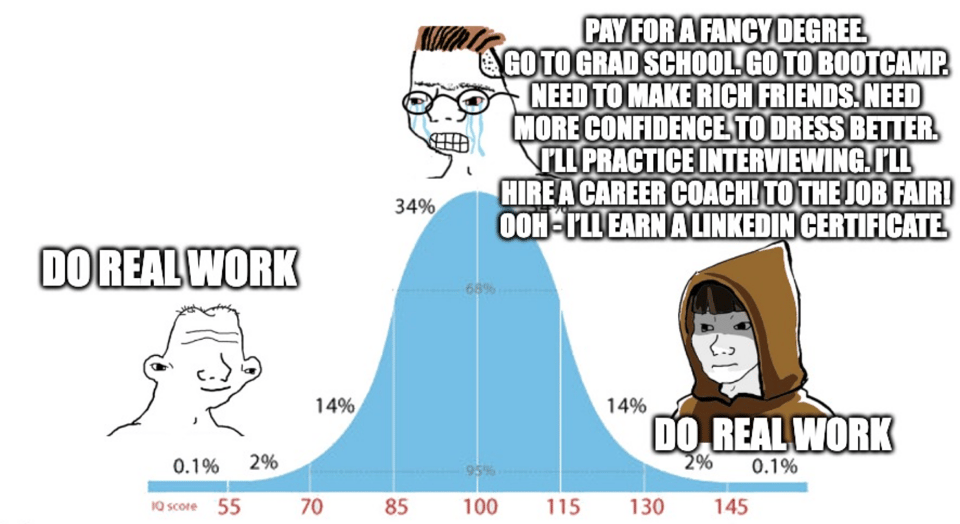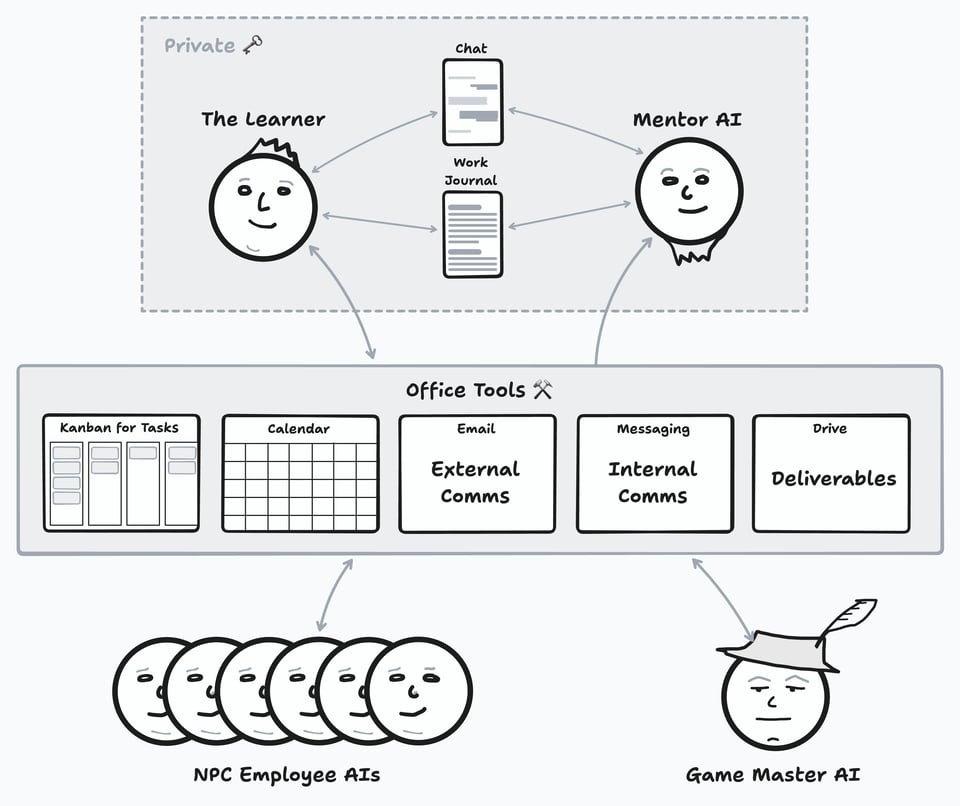Do Real Work: Introducing Next LX
Learn by doing real work in a realistic environment using real tools. Introducing Next LX, a startup redefining job training.
Do Real Work
I've spent the last five years or so learning how learning works and I've boiled it down to one simple statement: we learn by doing.
Books and lectures are entertaining, but unless we are in a context where we can apply that knowledge immediately, it doesn't stick.
What was the last book you read that changed your life? I'm willing to bet that book connected to something you were experiencing and you were able to put it into practice as soon as you read it.
Because we learn by doing, we need a context where we can apply the learning. So the best way to learn would be in an environment where learning and doing are intimately connected, where application is assumed and automatic, where the doing needs to be done and the learning merely meets that need. In other words, learn by doing real work in a realistic environment using real tools.
Today, post-high school education is anything but real. Learning is centered on lectures, classrooms, worksheets, essays, grades. This learning environment is miles away from how the real world works. So we shouldn't be surprised when new college grads are unprepared for their first job.

One of the saddest things I've witnessed is someone graduating with a computer science degree, after four years of hard work and expense, getting their first job and discovering that though they did well in class, they hate the job of software engineer. Not once during their studies did they develop a sense of what doing the real work would be like!
Most people today walk this default path, if they can even afford it. And that path fails to prepare them do real work.

We can do better. Enter Next LX.
With the help of a good friend, we are building a simulated workplace where job skills can be learned in context by doing them, surrounded by masters who can mentor you as you grow in your ability to do real work. Rather than take an online course or enroll in community college, you do real work in a real remote work environment using the real tools of the trade.
How are we simulating such an environment?
As many of you will have guessed (some with elation, some with horror I'm sure), we are using AI. LLMs open up many doors in the adjacent possible, and we believe they open a big one for reinvigorating job training.

We're using LLMs in three major ways:
Your coworkers in the simulated environment are powered by AI. Not all of them, but most of them. We are looking at opportunities to bring interactions with real humans into the virtual workplace, but we can give a tremendous sense of presence by surrounding you with what feels like a living, breathing company full of busy, competent bots-as-people that you can actually interact with.
The training scenarios are generated and assessed by AI. If you talk to anyone doing curriculum development these days, they'll tell you that LLMs do a fantastic job of generating rubrics, creating projects, sequencing, and assessing (particularly when given human-graded examples!)
The training assumes that AI-enabled tools will be used to do the job. We're training people for the jobs of tomorrow, today.
How will we get paid? We plan to start simple: we earn a placement fee whenever we get people a job, just like a recruiter.
Thanks to AI, the next few years will be a major shake-up for the job market: millions of jobs will be destroyed and created. Recruiting and placement is a $757 billion industry (yep, that's a "b"). We’re a better recruiter by providing "fit to spec" workers even as required skills for jobs rapidly shift. We’re a better choice after high school because we're not offering degrees but jobs.
It's a better way to learn: do real work.
Yes, this is technically a startup. And we are raising a seed round (reach out if you're interested). While I know that's anathema to some in the future of computing research world, my fundamental beliefs and values haven't changed:
We're ~60 years into computing's 500 year revolution. Low-hanging fruit abounds. As we're creating a better learning environment, we're also exploring what it's like to model LLMs as coworkers, with access to all of the same tools a human collaborator has.
My long-term career goal is distill and disseminate generalizable insights. To that end, I'll be working out loud on Twitter and in the public Next LX Discord (👈 come hang out!) and continuing to share openly through this newsletter.
The value of software is not in the bits but in the running environment surrounded by the context of a company. We'll open-source whatever software is worth sharing.
I believe Next LX can be a context of use where we can test ideas about LLMs, education, and even the nature of collaboration software. If I've learned anything from the last few years, the best way to fund transformative research in computing is with a highly profitable company. So I'm building one. (At least, we're gonna try.)
In closing,
If novel learning environments sound interesting, you have experience with learning simulations, or you're building LLM-powered software, I'd love to talk. (As always, you can just reply to this email).
If you know of someone who would love this idea, forward this to them. Introductions are also appreciated!
ICYMI: Stuff I've worked on
I gave a live demo of a very early version (just 2.5 weeks in!) of Next LX at a South Park Commons AI Interfaces event last month. The rest of the talks were excellent!
Glimpses of the Future
If you're a software engineer and you're not already using Cursor, let me strongly encourage you to give it a try (or Zed, which launched their AI integration this week). Copilot has been around for a while, yes. The last few weeks I've been using Cursor's chat (and composer) interface to make changes across files, and I've gotten to where I do almost all of my coding in English. Simon Willison talked about the recalibration that happens over time as you get used to how much more productive you can be on certain kinds of problems with LLMs. Start recalibrating; the speedup is real. If you prefer to watch someone else's Cursor workflow, this livecoding video with Sahil Lavingia and Josh Pigford is a good introduction.